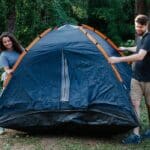The Federal Emergency Management Agency (FEMA) said that in 2022, 45% of adults self-reported that they are prepared for a disaster. This is great news, as this percentage has increased over time. However, that leaves more than half of the population unprepared and at risk.
Many emergencies like natural disasters or being lost outdoors can cause issues that aren’t handled easily by the social systems and tools or gadgets we often rely upon. In these scenarios, basic survival skills can play an essential role in keeping yourself safe as you weather the storm.
Basic survival skills such as first aid, risk assessment, and outdoor and weapon safety, can all come in handy when you are faced with actual emergencies. All of these skills can provide practical assistance as well as a sense of calm and security, which can be crucial for survival in difficult situations.
What Are “Basic” Survival Skills?
Learning a few basic survival skills can help you feel significantly more confident in an emergency. While it can often seem that you need to be an expert in all of these areas, the basics are what end up being used and relied upon the most.
Starting at the basic, beginner levels of knowledge in these areas will provide a solid foundation to build upon or rely upon in an emergency. These skills are only considered “basic” because of their importance and the need for them in all situations, making them an essential set of skills to have in your arsenal.
First Aid
Debatably one of the most basic skills out there, first aid is also one of the most important. It can make the difference between treating a small wound properly and losing a limb because of infection.
Basic first aid skills include learning proper wound care, CPR, assessment and documentation for first responders, and maintaining patient comfort.
These skills can be acquired through short first aid courses, and you can build upon your skills at home or through more advanced courses. The wilderness first aid (WFA) courses offer skills that help you treat patients with few resources on hand.
You’ll also learn how to prepare an emergency first aid kit that you can have on hand in case of disaster. Keeping yourself informed and prepared can keep you safe in a survival scenario, and basic first aid is a great place to start.
Risk Assessment
In an emergency, you can face a wide array of threats. These range from environmental threats such as storms and wild animals to human threats, disease, or the threat of limited resources. ‘
Regardless of the threat you face, there will always be risks that should be closely assessed and planned for. Risk assessment is a huge part of survival and can be considered one of the best basic skills.
Risk assessment involves identifying, planning for, and avoiding specific threats. This comes in handy when you’re facing any level of risk in a survival scenario, but it also comes into play throughout your day-to-day life.
You can practice risk assessment simply by choosing certain routes to drive to work or making certain choices on a short hike.
Outdoor Safety
Outdoor safety is a survival skill that encompasses a variety of techniques and practices to keep individuals safe and prepared when exploring and enjoying the outdoors. This includes knowledge of weather patterns, first aid skills, navigation skills, campsite selection, food and water safety, and awareness of potential environmental hazards such as wildlife or dangerous terrain.
Outdoor safety skills are important because they can prevent accidents, injuries, and illnesses that could become life-threatening in remote areas without immediate access to medical care or emergency services.
By understanding and practicing outdoor safety skills, individuals can make informed decisions about where and how to travel, what gear to bring, and how to respond to emergencies.
Some basic outdoor safety skills include packing appropriate gear, dressing in layers for changing weather conditions, staying hydrated, and avoiding dangerous wildlife. These skills can be learned through courses, practice, and experience, and can help ensure a safe and enjoyable outdoor experience.
Weapon Safety
Weapon safety is an essential survival skill that involves understanding how to safely handle, store, and use firearms, knives, and other weapons.
Whether it’s for hunting, self-defense, or survival situations, improper handling of a weapon can result in serious injury or death.
Weapon safety includes knowledge of firearm mechanics, proper grip and stance, safe loading and unloading procedures, and awareness of the surroundings before and during use. It also involves responsible storage and transportation of weapons to prevent unauthorized access or accidents.
By practicing weapon safety, individuals can protect themselves and others from harm and increase their chances of survival in dangerous situations.
Where Can You Learn Basic Survival Skills?
Online
There are a variety of online resources available to learn basic survival skills, including websites, blogs, and YouTube channels. These can be a great low-cost/free option if you do well on your own and are self-motivated.
Online courses such as those offered by NOLS (National Outdoor Leadership School) and Udemy also provide comprehensive instruction on topics such as wilderness first aid, navigation, and survival mindset.
Additionally, many survival experts and instructors offer online coaching and consulting services for personalized guidance and support.
Courses
Taking in-person courses is an excellent way to receive hands-on instruction and training in survival skills. Many organizations offer survival courses, such as the Boy Scouts of America, REI, and various wilderness schools.
In-person courses allow for direct interaction with experienced instructors who can provide personalized guidance and feedback. Additionally, they often include practical scenarios and simulations that allow students to apply their skills in a realistic setting.
By taking in-person courses, individuals can gain the confidence and skills necessary to handle unexpected situations and increase their chances of survival in the outdoors.
Bootcamps
If you’re short on time, a boot camp will drill the most information into you in the shortest period. These tend to be a higher cost but can be effective to take on a ton of new learning without much time commitment.
Benefits of Learning Basic Survival Skills
Learning basic survival techniques can provide numerous benefits, including increased confidence and self-reliance in outdoor or emergency situations, potentially life-saving knowledge of first aid, navigation, shelter building, and food and water procurement.
Additionally, learning survival techniques can be a fun and rewarding experience that can lead to personal growth and new hobbies. You can find ways to go out and try nature therapy, longer survival trips, and even create a long-term survival camp that you can revisit.
Finally, it can foster a deeper appreciation of the natural world and promote a sense of environmental responsibility.





